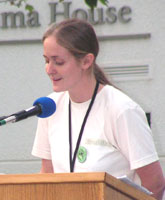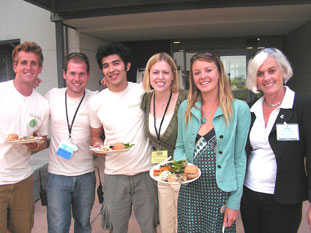“Sustainability,” the issue of whether or not the human life support system on earth can continue indefinitely, became a buzz word during the environmental movements of the 1960s when popular books such as Rachel Carson’s Silent Spring linked the health of the environment directly to economic development. Concerns about sustainability issues have increased dramatically over the years and have resulted in the formation of numerous national and international think tanks and groups devoted to the subject. The University of California now has a system-wide “green” building and clean energy policy, and UCSB is the first of the UC schools to have an active sustainability group on campus.
According to the UC Regents, sustainability means “meeting our own needs of the present, without compromising the ability of future generations to meet their own needs, particularly with regard to use and waste of natural resources. Sustainable practices support ecological, human, and economic health and vitality. Sustainability presumes that resources are finite, and should be used conservatively and wisely with a view to long-term priorities and consequences of the ways in which resources are used.” The UCSB Campus Sustainability Plan Mission Statement mandates that UCSB “will become a steward for our community and a global leader for sustainability through education, research, and action” ).
Geography staff member Katie Maynard, the UCSB Sustainability Coordinator and Organizer of the recent UC, CSU, CCC Sustainability Conference (June 25-28), offers her own personal definition of sustainability: “Sustainability is an ideal state, which we most likely will never reach fully but will continue to strive for, where we think critically and inventively about every action we take and are planning to take and about what the impact of that action is on People, the Environment, and the Economy today and in the future. In order to be sustainable we must think about all of the interconnections, intended and unintended consequences, and what will happen many generations from today if we continue to do what we are doing now. Sustainability is often focused on conserving environmental resources, but I believe it is more than just that and includes the sustainability of ourselves and making sure we are well fed, have sustainable incomes, and are getting enough time to spend having fun and enjoying this community and the earth we are trying to support.”
The first state-wide UC Sustainability Conference took place at the UCSB Bren School of Environmental Science in 2002 in conjunction with the “green building’s” opening, and it had 100 participants (invitation only). Bren was the first laboratory building in the nation to earn the top “platinum” rating for meeting standards of “Leadership in Energy and Environmental Design” (LEED) as defined by the US Green Building Council, a coalition of nearly 6,000 leaders from across the building industry working “to promote buildings that are environmentally responsible, profitable and healthy places to live and work.” Since then, UC Sustainability Conferences have been held at UC Merced in connection with its ground breaking in 2003; at UCSB again in 2004 (co-hosted by David Gonzales in Facilities and Mo Lovegreen in Geography); at UC Santa Cruz in 2005; and, this year, back once again at UCSB where it was co-hosted by Marc Fisher (Campus Design & Facilities), Ernst von Weizsacker (Dean, Bren School), Willie Brown (Director, Housing & Residential Services), and Mo Lovegreen (Department of Geography). UC Sustainability Conference attendance has grown steadily since its inception, reaching over 600 this year, and the major sustainability themes have expanded from green building to include the management of energy, water, transportation, food, procurement, and recycling, as well as institutionalizing sustainability.
The Department of Geography is proud to have co-hosted this year’s Sustainability Conference and to have given the UCSB Campus Sustainability Plan and its supporters a physical home. As the department’s vision statement puts it, “The Department of Geography aims to be the intellectual home of choice for studies of Earth as the home of humanity,” and it is fitting that a department that offers such courses as “Environmental Issues and Location Decision Making” (Geog. 185B) and “Intense Mock Environmental Summit” (Geog. 135S) should host the Campus Sustainability Plan. As Katie puts it, “The UCSB Department of Geography has shown its leadership in sustainability by dedicating staff time, particularly that of the Executive Officer of Geography, Mo Lovegreen, to promoting sustainability throughout the university and providing housing to many new sustainability initiatives and staff. By housing the practical application and teaching of sustainability within one department, we have been able to create many powerful linkages which will help UCSB meets its overall sustainability goals.” (Sustainability Staff pictured above, from left to right: Ian Peterson, Christian Port, Ron Donaire, Whitney Morris, Katiyana Williams, and B.J. Danetra)
Editor’s Note: Students interested in sustainability should sign up for Urban Geography (Geog. 108) and Introduction to Transportation Systems Planning (Geog. 111), both of which are offered this fall. Contact Laura Harrison, our Undergraduate Advisor, for details.

.jpg)


